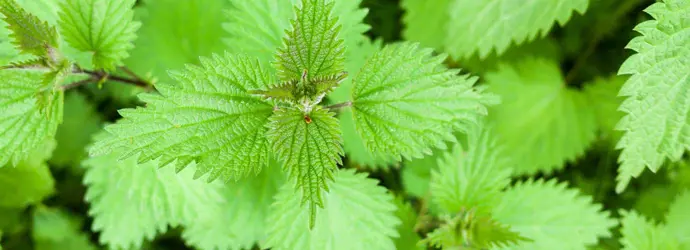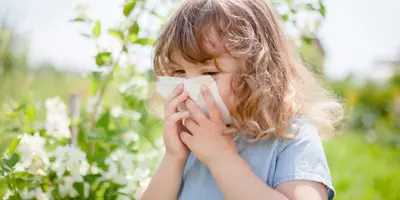364 people found this helpful

There’s nothing you wouldn’t do for those you love: freezing cold walkies in the rain, sneaky sausage treats under the table, even knee-deep ventures into thick, scratchy nettles to fetch your four-legged friend’s wayward ball. But with ankles riddled with itchy red bumps, you’re not really considering walking on, and ignoring them – are you? Take a (dock) leaf out of Kenny’s book and give yourself a moment to relieve your nettle sting. The dog can wait two minutes. Discover these home remedies for nettle sting relief.
If you’re experiencing difficulty breathing after a nettle sting, or if your nettle sting hasn’t disappeared in over 24 hours, call your emergency services immediately.
What causes nettle stings?
Stinging nettles, or to go by their official name, Urtica dioica, are grown widely across the UK and Europe, and most of the time, getting stung by one of these is not too serious, but it can be in rare cases.1 Before we dive into what nettle rash home remedies there are and how to create a stinging nettle treatment, it might help to know what causes the sting in the first place.
Like Kenny – our champion of all things selfishly soft – nettle plants are hairy creatures! Unlike Kenny, though, nettles have stinging hairs on their stem and the edges of their leaves; these hairs act like a needle that transfers histamine and formic acid onto the surface of your skin2, causing irritation that can feel quite annoying and itchy. According to studies, their stinging ‘hairs’ were developed as an adaptation to prevent herbivores from eating them – a layer of protection against predators2. Kenny doesn’t eat them either – he much prefers Eucalyptus leaves!
Nettle sting symptoms
It should be pretty clear when you’ve been stung due to the itching sensation you will feel. However, the "sting” can vary, ranging from a very brief and minor inconvenience to something that may last a bit longer. In these cases, you may feel a burning sensation, as well as see raised bumps or hives where you have been stung, which are often lighter than your skin colour and can be up to 1cm wide3. Nevertheless, please always check in with your GP or local doctor if you are worried at all about your symptoms or want a second opinion on nettle allergy relief options.
Symptoms are more or less severe depending on the total area of skin that has come into contact with the nettles. Some other nettle sting symptoms may be:
- Redness.
- Swelling.
- Numbness in the affected area.
- Blisters.3
3 home remedies for nettle stings
The best thing for nettle stings is to resist touching the rash for the first 10 minutes. Nettle histamines are also easier to clean and treat when they’re dry.4 So, while we all know how keen you are to keep calm and carry on, and on, and on – we get it, you’re fine – you deserve to take a moment to tend to your wounds.
Here are a few home remedies that can help relieve nettle sting symptoms you may be experiencing:
- Dock leaves. The wilderness may have stung you, but it also provides a handy cure for nettle stings. Dock leaf sap contains an antihistamine that counteracts and soothes the nettle sting. You can identify them by their large, green, oval leaves. Rub them gently on the sting to get some nettle sting relief.5
- Baking soda. Baking soda is the simplest home remedy for nettle stings. It’s an alkaline which neutralises the nettle sting’s acid.5 Mix a few drops of cold water with some baking soda in a cup. Then, spread it over the sting using a gentle cloth.
- Wash it. Soap is also an alkaline.6 Run cold water over your sting, then use a soft tissue, cold water, and some diluted dish soap to clean the area. If you want to be thorough, try using sticky tape or a wax strip to remove any of the nettle’s hairs that might still be in your skin.
Most commonly, a stinging nettle rash should disappear within 24 hours, with the aid of these stinging nettle treatments. These home remedies for nettle stings are easy to make and the area should start to calm down in the next 30 minutes or so once administered. Claim this time for yourself: lock yourself away, pop your headphones in, listen to a podcast, audiobook, your favourite tunes. You – and your red little ankles – deserve it after everything you’ve given today.
In a world where all your efforts go to others, it’s important not to forget about number one. Luckily for you, it’s easy to take a moment for yourself once, twice, or maybe even three times a day. Stock up on Cushelle Quilted toilet paper for a soft and skin-loving* clean. Why? Because you – and your behind – deserve the best.
When does a nettle sting become an emergency?
As mentioned before, in rare cases, a nettle sting can have more severe repercussions, such as an allergic reaction. In these cases, medical attention should be sought immediately as a severe allergic reaction could be life-threatening.
Seek immediate medical attention if you experience any of these nettle sting symptoms:
- Tightness in your chest or throat.
- Difficulty breathing or wheezing.
- Swelling in the mouth.
- Stomach cramps.
- Vomiting.
- Diarrhoea.
- A rash in areas that haven’t come into contact with the nettles.
Tips for preventing nettle stings in the future
If you love to take walks in nature, it’s likely you won’t be able to avoid nettle stings completely, forever. But there are some tips you can follow for the next time you’re out and about:
- If you enjoy going on long walks through natural areas, it’s a good idea to avoid overgrown paths or venturing into long grass when out for walks.
- If it’s unavoidable (i.e., if your favourite furry friend fails to fetch his toy from the bushes in favour of a brand-new stick, and it’s up to you to retrieve it), try wearing long clothing that protects your arms and legs.
And while getting stung is best avoided, stinging nettles aren’t all bad – they can be used in recipes or as a natural remedy for aches and pains. If you’re planning on picking nettles for a recipe or remedy, take note of where the hairs are on the leaves, and always keep your hands near the top of the plant. Use these tips to safely pick nettles:
- You should grab the leaf with haste from the direction the hairs are growing, then twist and pluck the plant out of the ground.
- Remember to wear thick gloves.
Now you know everything you need to know about stinging nettles, from causes and symptoms of nettle sting, to what can you do to stop itching from nettles. You've now also got some handy tips for preventing the irritation that comes along with coming into contact with the plants with our stinging nettle remedy tips.
So, remember, when you’re stung by a nettle, you deserve to take a moment for you.
*To verify claims, please email verify.uk@essity.com for full verification details.
Sources:
1 Stinging nettle | Description & Uses | Britannica, Encyclopedia Britannica
2 Investigating leaf adaptations – why do nettles sting?, SAPS (Science & Plants for Schools)
3 Stinging Nettles, Ministry of Health
4 Nettle Stings – Symptoms & Treatment – Advice, St John Ambulance
5 Why do nettles sting? And do dock leaves really help?, The Woodland Trust
6 Evaluation of pH of Bathing Soaps and Shampoos for Skin and Hair Care, National Institutes of Health
Related articles
5 oily skin tips: how to cope with oily skin
Learn how to prevent oily skin with your skincare routine, diet and home remedies for oily skin, plus the best make-up for shiny skin. Click here for more

5 beauty hacks that will streamline your on-the-go routine
A clean and organised makeup bag means a smooth and hygienic beauty routine. Read on for the makeup beauty hacks and makeup tips and tricks that’ll streamline on-the-go pampering.

How to get over a persistent cough
Need help figuring out how to get over a persistent cough? Find out how to stop constant coughing, and some home remedies for persistent coughs, here.

Pollen allergy in children: How to cope with kids’ hay fever
The symptoms of pollen allergy in children can be tackled. Click here for tips on how to treat hay fever in children.

The best ways to stop coughing at night
Need a night cough remedy? Try our home remedies for a dry cough at night so that you can ease coughing at night.

Runny nose remedies: 6 ways to stop a runny nose
Looking for a runny nose remedy you can make at home? For five family-friendly ways to stop a runny nose, click here.



